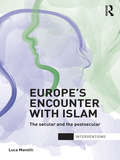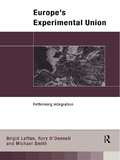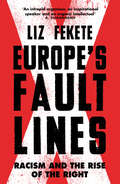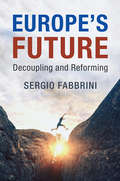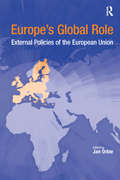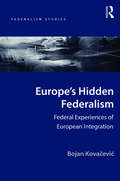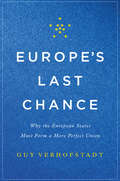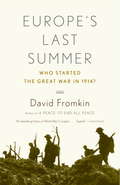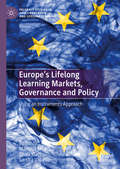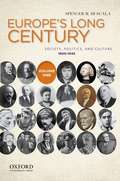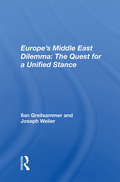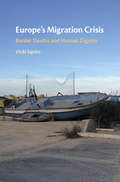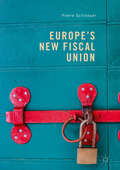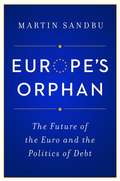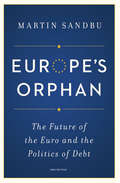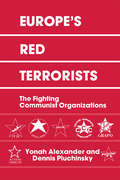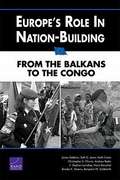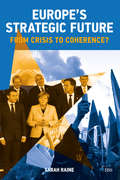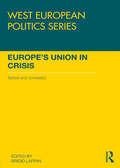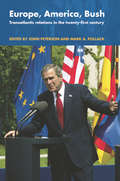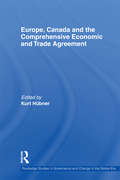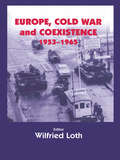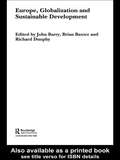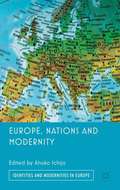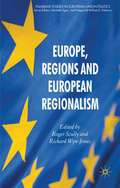- Table View
- List View
Europe's Encounter with Islam: The Secular and the Postsecular (Interventions)
by Luca MavelliIn the last few years, the Muslim presence in Europe has been increasingly perceived as ‘problematic’. Events such as the French ban on headscarves in public schools, the publication of the so-called ‘Danish cartoons’, and the speech of Pope Benedict XVI at the University of Regensburg have hit the front pages of newspapers the world over, and prompted a number of scholarly debates on Muslims’ capacity to comply with the seemingly neutral and pluralistic rules of European secularity. Luca Mavelli argues that this perspective has prevented an in-depth reflection on the limits of Europe’s secular tradition and its role in Europe’s conflictual encounter with Islam. Through an original reading of Michel Foucault’s spiritual notion of knowledge and an engagement with key thinkers, from Thomas Aquinas to Jurgën Habermas, Mavelli articulates a contending genealogy of European secularity. While not denying the latter’s achievements in terms of pluralism and autonomy, he suggests that Europe’s secular tradition has also contributed to forms of isolation, which translate into Europe’s incapacity to perceive its encounter with Islam as an opportunity rather than a threat. Drawing on this theoretical perspective, Mavelli offers a contending account of some of the most important recent controversies surrounding Islam in Europe and investigates the ‘postsecular’ as a normative model to engage with the tensions at the heart of European secularity. Finally, he advances the possibility of a Europe willing to reconsider its established secular narratives which may identify in the encounter with Islam an opportunity to flourish and cultivate its democratic qualities and postnational commitments. This work will be of great interest to students and scholars of religion and international relations, social and political theory, and Islam in Europe.
Europe's Experimental Union: Rethinking Integration
by Michael Smith Brigid Laffan Rory O' DonnellEurope's Experimental Union challenges conventional writings on European integration by situating the analysis of the EU in the context of changing patterns of political and economic order. The authors conclude that the union is not evolving towards a federal superstate, but rather, is an arena of deep economic integration governed by a prismatic polity characterised by innovation, experimentation, pragmatism, decentralisation and devolution. Although it may seem unsettleed, this book reveals that in fact the experimental nature of the EU enablwes it to respond to multiple agendas and Europe's diversity in a flexible manner.
Europe's Fault Lines: Racism and the Rise of the Right
by Elizabeth FeketeAn expansive investigation into the relationship between contemporary states and the far-rightIt is clear that the right is on the rise, but after Brexit, the election of Donald Trump and the spike in popularity of extreme-right parties across Europe, the question on everyone’s minds is: how did this happen? An expansive investigation of the ways in which a newly configured right interconnects with anti-democratic and illiberal forces at the level of the state, Europe’s Fault Lines provides much-needed answers, revealing some uncomfortable truths. What appear to be “blind spots” about far-right extremism on the part of the state are shown to constitute collusion—as police, intelligence agencies and the military embark on practices of covert policing that bring them into direct or indirect contact with the far right, in ways that bring to mind the darkest days of Europe’s authoritarian past. Old racisms may be structured deep in European thought, but they have been revitalised and spun in new ways: the war on terror, the cultural revolution from the right, and the migration-linked demonisation of the destitute “scrounger.” Drawing on more than three decades of work for the Institute of Race Relations, Liz Fekete exposes the fundamental fault lines of racism an tarianism in contemporary Europe.
Europe's Future: Decoupling and Reforming
by Sergio FabbriniSergio Fabbrini proposes a way out of the EU's crises, which have triggered an unprecedented cleavage between 'sovereignist' and 'Europeanist' forces. The intergovernmental governance of the multiple crises of the past decade has led to a division on the very rationale of Europe's integration project. Sovereignism (the expression of nationalistic and populist forces) has demanded more decision-making autonomy for the EU member states, although Europeanism has struggled to make an effective case against this challenge. Fabbrini proposes a new perspective to release the EU from this predicament, involving the decoupling and reforming of the EU: on the one hand, the economic community of the single market (consisting of the current member states of the EU and of others interested in joining or re-joining it); and on the other, the political union (largely based on the eurozone reformed according to an original model of the federal union).
Europe's Global Role: External Policies of the European Union
by Jan OrbieFirst published in 2008 and based on an innovative framework for analysing the EU's external politics, this paperback edition provides a historical overview of and theoretical conclusions about the EU's global role. Taking an original approach, the volume highlights the expanding political science literature on Europe's international role in a range of external policy domains. It focuses in particular on the 'soft' dimension of Europe's international action which has previously been much neglected. Carefully structured to make this ideal supplementary reading for students and scholars of European politics and foreign policy, the book will equally appeal to a wider audience in political economy, security policy and international relations more generally.
Europe's Hidden Federalism: Federal Experiences of European Integration (Federalism Studies)
by Bojan KovacevicThe hidden federal features of the European Union help explain the challenges of legitimacy, democracy and freedom that face an unfinished political community. Ideas about federalism and the reality of existing federal states cannot be sharply divided in an analysis of the EU’s multilevel political order, but so far, both scholars and major decision makers have shown interest only in the normal functioning of federal systems: ignoring the dilemma of the federation’s legitimate authority has resulted in an existential crisis for the EU which has become ever more manifest over recent years. This book employs a combination of political philosophy and political science, of federal philosophic ideas and their traces in real federal institutions, in order to achieve the task of understanding the federal features of the EU governance system. The first part of the work focuses on building an appropriate theoretical framework to explain the new meanings attached to familiar notions of democracy, legitimacy and citizenship in the context of a political community like the EU. In the second part the federal features of the EU’s political system are examined in comparison to other current and historical federal perspectives like the US, Switzerland, Yugoslavia and Germany. Through an analysis of the hidden federal aspects of the EU and the links between hidden federalism and the EU’s legitimacy crisis, this book reveals the patterns that should be avoided and gives us guidelines that should be followed if the EU is to become democratic and politically united without jeopardising the state character of its members.
Europe's Last Chance: Why the European States Must Form a More Perfect Union
by Guy VerhofstadtIn the heart of Europe's current crisis, one of the continent's foremost statesmen issues a clarion call to radically remake the European Union in the mold of the United States' own federal governmentEurope is caught in its greatest crisis since the Second World War. The catalog of ills seems endless: an economic crisis spread through most of Europe's Mediterranean tier that has crippled Greece and driven a wedge between northern and southern Europe; terrorist attacks in Paris, Cologne, Brussels, and Nice; growing aggression from Russia in Ukraine and the Baltic states; and refugees escaping war-torn neighbors. The European Union's inability to handle any of these disasters was a driving factor in Great Britain voting to leave, and others may soon follow. The result won't just be a continent in turmoil, but also a serious threat to American and British security-the Atlantic, let alone the Channel, simply isn't big enough to keep European troubles in Europe. For everyone's sake, Europe must survive.The question is how. In Europe's Last Chance, Guy Verhofstadt-former prime minister of Belgium and current leader of the liberal faction in the European Parliament-provides the essential framework for understanding Europe today, laying bare the absurdity of a system in which each member state can veto legislation, opt in or out of the Euro, or close borders on a whim. But Verhofstadt does not just indict the European Union, he also offers a powerful vision for how the continent can change for the better. The key, argues Verhofstadt, is to reform the European Union along the lines of America's federal government: a United States of Europe strong enough to stand with the United States of America in making a better, safer world.A visionary book from one of today's luminaries of European leadership, Europe's Last Chance is a clarion call to save the European Union, one of the world's greatest chances for peace and prosperity.
Europe's Last Summer: Who Started the Great War in 1914?
by David FromkinThe Great War not only destroyed the lives of over twenty million soldiers and civilians, it also ushered in a century of huge political and social upheaval, led directly to the Second World War and altered for ever the mechanisms of governments. And yet its causes, both long term and immediate, have continued to be shrouded in mystery. In EUROPE'S LAST SUMMER, David Fromkin reveals a new pattern in the happenings of that fateful July and August, which leads in unexpected directions. Rather than one war, starting with the assassination of Archduke Franz Ferdinand, he sees two conflicts, related but not inseparably linked, whose management drew Europe and the world into what The Economist described as early as 1914 as 'perhaps the greatest tragedy in human history'.
Europe's Lifelong Learning Markets, Governance and Policy: Using an Instruments Approach (Palgrave Studies in Adult Education and Lifelong Learning)
by Marcella Milana Gosia Klatt Sandra VatrellaThis book explores European governance and policy coordination within lifelong learning markets. Using an instruments approach, the editors and contributors examine the ways in which governance mechanisms employed by the European Union influence policy to regulate lifelong learning, and intervene in lifelong learning markets, at both European and national levels. Filling an important gap in the current literature, this book examines how strengthened policy coordination at the EU level contributed to the blurring of boundaries between policy fields and the redefinition of the function of adult education after the 2008 recession. Divided into three parts, this book draws on a range of case studies from countries including Spain, Denmark, Bulgaria and the UK. It will be of interest and value to students and scholars of education policy and governance, adult education and lifelong learning.
Europe's Long Century: Society, Politics, And Culture 1900-1945 Volume 1
by Spencer M. Di ScalaThe twentieth century has been interpreted as a short century marked by extremes. According to this view, the century lasted only from 1914 to 1989 or 1991. These dates coincide with the rise and fall of communism that came to power in Russia in 1917 and ended with the fall of the Berlin wall (1989) or that of the Soviet Union (1991). Thus, the concept of a short century is unduly influenced by a Cold War perspective. In Europe's Long Century, Spencer Di Scala presents an alternative view that will be more helpful to undergraduate history students in the twenty-first-century: namely, that twentieth century Europe was actually a long" century lasting approximately from 1900 to 2000 with patterns and antecedents discernible before the century began and that continue to be elaborated today. Comprehensive, current, and affordable, Europe's Long Century integrates the histories of Eastern Europe, Scandinavia, and the Balkans that are often neglected in similar treatments. It also thoroughly covers the role of science in shaping modern European life, and the book's "biographical sketches" profile the lives of important - though not always well known - people who influenced Europe's long century. "
Europe's Middle East Dilemma: The Quest For A Unified Stance
by Ilan GreilsammerThis book analyzes the principal landmarks in the evolution of a unified European stance toward the Middle East conflict, placing events in the context of the contemporary political and economic circumstances. It offers a theoretical scheme for the study of European political cooperation. .
Europe's Migration Crisis: Border Deaths and Human Dignity
by Vicki SquireRejecting claims that migration is a crisis for Europe, this book instead suggests that the 'migration crisis' reflects a more fundamental breakdown of a modern European tradition of humanism. Squire provides a detailed and broad-ranging analysis of the EU's response to the 'crisis', highlighting the centrality of practices of governing migration through death and precarity. Furthermore, she unpacks a series of pro-migration activist interventions that emerge from the lived experiences of those regularly confronting the consequences of the EU's response. By showing how these advance alternative horizons of solidarity and hope, Squire draws attention to a renewed humanism that is grounded both in a deepened respect for the lives and dignity of people on the move, and an appreciation of longer histories of violence and dispossession. This book will be of interest to scholars and researchers working on migration in political science, international relations, European studies, law and sociology.
Europe's New Fiscal Union
by Pierre SchlosserThe euro crisis made Europe’s stateless currency falter. This book retraces and interprets the ways in which the crisis impacted the unique institutional set-up of Europe’s Economic and Monetary Union (EMU). It argues that the crisis propelled the European continent towards the institutionalization of an unprecedented form of centralized authority: Europe’s New Fiscal Union. Diving into the central functions of fiscal surveillance, financial assistance, lending of last resort and banking resolution, the book reveals how a covert and convoluted mutualisation process occurred in the shadow of the euro crisis management. Based on 62 interviews conducted by the author with senior policy-makers in Brussels, Frankfurt, Helsinki and Rome, the book claims that Europe’s New Fiscal Union is largely unsettled and still unstable. It therefore engages with the challenges arising from the patchwork of newly adopted rules, instruments and bodies, suggesting crucial reform steps to make EMU sustainable.
Europe's Orphan
by Martin SandbuOriginally conceived as part of a unifying vision for Europe, the euro is now viewed as a millstone around the neck of a continent crippled by vast debts, sluggish economies, and growing populist dissent. In Europe's Orphan, leading economic commentator Martin Sandbu presents a compelling defense of the euro. He argues that rather than blaming the euro for the political and economic failures in Europe since the global financial crisis, the responsibility lies firmly on the authorities of the eurozone and its member countries. The eurozone's self-inflicted financial calamities and economic decline resulted from a toxic cocktail of unforced policy errors by bankers, politicians, and bureaucrats; the unhealthy coziness between finance and governments; and, above all, an extreme unwillingness to restructure debt. Sandbu traces the origins of monetary union back to the desire for greater European unity after the Second World War. But the euro's creation coincided with a credit bubble that governments chose not to rein in. Once the crisis hit, a battle of both ideas and interests led to the failure to aggressively restructure sovereign and bank debt. Ideologically informed choices set in motion dynamics that encouraged more economic mistakes and heightened political tensions within the eurozone. Sandbu concludes that the prevailing view that monetary union can only work with fiscal and political union is wrong and dangerous--and risks sending the continent into further political paralysis and economic stagnation. Contending that the euro has been wrongfully scapegoated for the eurozone's troubles, Europe's Orphan charts what actually must be done for the continent to achieve an economic and political recovery.
Europe's Orphan: The Future of the Euro and the Politics of Debt
by Martin SandbuOriginally conceived as part of a unifying vision for Europe, the euro is now viewed as a millstone around the neck of a continent crippled by vast debts, sluggish economies, and growing populist dissent. In Europe's Orphan, leading economic commentator Martin Sandbu presents a compelling defense of the euro. He argues that rather than blaming the euro for the political and economic failures in Europe since the global financial crisis, the responsibility lies firmly on the authorities of the eurozone and its member countries. The eurozone's self-inflicted financial calamities and economic decline resulted from a toxic cocktail of unforced policy errors by bankers, politicians, and bureaucrats; the unhealthy coziness between finance and governments; and, above all, an extreme unwillingness to restructure debt. Sandbu traces the origins of monetary union back to the desire for greater European unity after the Second World War. But the euro’s creation coincided with a credit bubble that governments chose not to rein in. Once the crisis hit, a battle of both ideas and interests led to the failure to aggressively restructure sovereign and bank debt. Ideologically informed choices set in motion dynamics that encouraged more economic mistakes and heightened political tensions within the eurozone. Sandbu concludes that the prevailing view that monetary union can only work with fiscal and political union is wrong and dangerous—and risks sending the continent into further political paralysis and economic stagnation. Contending that the euro has been wrongfully scapegoated for the eurozone’s troubles, Europe’s Orphan charts what actually must be done for the continent to achieve an economic and political recovery. This revised edition contains a new preface addressing the economic and political implications of Brexit, as well as updated text throughout. Europe’s Orphan charts what actually must be done for the continent to achieve a full recovery.
Europe's Red Terrorists: The Fighting Communist Organizations
by Yonah Alexander Dennis A. PluchinskyThis unique volume explores Europe's most dangerous communist terrorist organizations and reveals how they use violence as a means of political communication and persuasion. It outlines seven terrorist groups from Germany, Greece, Spain, France, Belgium, Italy and Turkey and gives their modus operandi, rationale and political messages in translated communiqués never before available in English.
Europe's Role in Nation-Building: From the Balkans to the Congo
by James Dobbins Keith Crane Seth G. Jones Christopher S. Chivvis Andrew RadinTwo previous RAND volumes addressed the roles of the United States and the United Nations in nation-building, defined as the use of armed force in the aftermath of a conflict to promote a durable peace and representative government. This volume presents six case studies of recent European-led nation-building missions: Albania, Sierra Leone, Macedonia, Cote d'Ivoire, the Democratic Republic of the Congo, and Bosnia. It also reviews the Australian assistance mission to the Solomon Islands. Using quantitative and qualitative measures to compare inputs (such military levels, economic assistance and duration) and outcomes (such as levels of security, economic growth, refugee return, and democracy), the analysis concludes that these European-led missions have been competently managed and, within their sometimes quite limited scope, generally successful. Most helped achieve sustained peace, gross domestic product growth, and representative government. The EU has a wide array of civil competencies for nation-building, but it is sometimes slow to deploy them in support of its military operations, particularly when these are conducted far from Europe. The UN offers the most cost-effective means to address most postconflict stabilization requirements and NATO the better framework for large-scale force projection in cases in which the United States is ready to participate. But the EU now offers European governments a viable alternative to both these organizations in cases in which European interests are high, U.S. interests are low, and the UN is, for some reason, unsuitable or unavailable.
Europe's Strategic Future: From Crisis to Coherence? (Adelphi series)
by Sarah RaineEurope has suffered a decade of crises, with sovereign-debt troubles leading to austerity policies that exacerbated divisions inside member states and between them. Thereafter the Union was confronted with the challenges posed by a revanchist Russia in Ukraine and by a surge in migration from the Middle East and other conflict zones. The June 2016 UK vote to leave the Union threatened further damage to an institution that acknowledges it has failed to punch its weight in the spheres of foreign, defence and security policy. While that is a chronic shortcoming, its impact is becoming more acute as economic power moves East and Europe can no longer count on the steadfast support and leadership of the United States. The costs of Europe’s failure to achieve strategic coherence and effect are steadily rising. This Adelphi book addresses the consequences of Europe’s multiple crises for its standing as a strategic actor, acknowledging its unique character and capabilities. It argues that strategic thought and action is belatedly being informed by the deteriorating security environment, and that nascent initiatives have the potential to effect a step-change. There are grounds for cautious optimism, visible in the success of stabilisation and counter-piracy operations as well as coordinated diplomatic activity. Also, the continent’s leading powers are becoming more pragmatic about how cooperation is organised within and beyond the Union. These developments offer the possibility that Europe might meet its aspirations to be a strategic actor of consequence, despite a long-track record of disappointment and the still-considerable obstacles that lie in its path.
Europe's Union in Crisis: Tested and Contested (ISSN)
by Brigid LaffanThe European Union faces a set of inter-related crises that it struggles to contain and address. By exploring how the EU responds to crises and conflict, this volume addresses both its resilience and vulnerability. The EU faces significant challenges: European integration is increasingly politicised; democratic politics within member states are increasingly volatile; challenger parties threaten the status quo; and party systems are shifting throughout Europe. These crises test both the EU and individual states, especially those that had to exchange interdependence in the Union for dependence on the Troika. Despite the tension of hard times, this volume points to patterns of continuity and change as the single market, somewhat side-lined and forgotten in the heat of crises, retains its role as the hard core of the Union and the EU’s most significant achievement. This book was originally published as a special issue of West European Politics.
Europe, America, Bush: Transatlantic Relations in the Twenty-First Century
by John Peterson Mark A. PollackEurope, America, Bush is the first study of underlying elements of continuity in the transatlantic relationship, as well as new and powerful forces for change. It offers a definitive assessment of whether, and how much, the election of George W. Bush, the events of 11 September, and conflict over Iraq mark genuine and lasting change in transatlantic relations. American and European experts assess transatlantic relations on matters of foreign and security policy, economic diplomacy, justice and internal security cooperation, environmental policy and relations with Russia, the Balkans and the Middle East. This is essential reading for all students with an interest in this key relationship in world affairs.
Europe, Canada and the Comprehensive Economic and Trade Agreement
by Kurt HübnerThe Great Recession and the turn towards all forms of protectionism stress the relevance of international trade policy. With the global economy undergoing deep structural changes, the negotiations between Canada and the EU on a Comprehensive Economic and Trade Agreement (CETA) present a real-time experiment that sheds light on the direction that the relationships between two economic units of the G8 will take. For Canada, an agreement with the EU would end its current dependency on the US; for the EU, an agreement with Canada would be a first with a G8-economy and indicate how its new trade strategy ‘Global Europe’ will look like. This book is the first to simultaneously analyze the undercurrents of this project and introduce the main topics at hand. CETA is much more than a simple free trade agreement, its breadth covers regulatory aspects in goods, services, and finance; the opening of public procurement markets; attitudes and policies of Canadian provinces towards liberalization; climate policies and international leadership claims of the EU in comparison to Canadian policy attempts; the challenges of the Euro project and the reform efforts; and the challenges of the Euro as a international reserve currency. CETA is a challenging project that will kick-start enormous changes in trade policy-making as well as in market openness in Canada. It will mark the EU’s efforts to re-make the Atlantic Economy. This book provides deep insights into the ambiguity of the project and addresses the implications of a rapidly changing global economy for trade policy. Offering analysis of the financial industry, banking, trade policy, climate change strategy, and the Euro exchange rate, this book should be of interest to students and policy-makers alike.
Europe, Cold War and Coexistence, 1955-1965 (Cold War History)
by Wilfried LothThis title examines the role of the Europeans in the Cold War during the 'Khrushchev Era'. It was a period marked by the struggle for a regulated co-existence in a world of blocs, an initial arrangement to find a temporary arrangement failed due to German desires to quickly overcome the status quo. It was only when the danger of an unintended nuclear war was demonstrated through the crises over Berlin and Cuba that a tacit arrangement became possible, which was based on a system dominated by a nuclear arms race.The book provides useful information on the role of Konrad Adenauer and the beginnings of the German 'new Eastern policy', as well as examining the Western European power policy in the era of Harold Macmillan and Charles de Gaulle.
Europe, Globalization and Sustainable Development (Environmental Politics #Vol. 5)
by John Barry Richard Dunphy Brian BaxterThis edited volume considers the ways in which European states and the European Union can and should organize themselves economically and socially in order to address the challenges of sustainable development. It will interest students and researchers of environmental policy and European politics.
Europe, Nations and Modernity
by Atsuko IchijoThis work offers a fresh perspective to the study of 'Europe' by placing the discussion of 'What is Europe?' and 'What is it to be European?', in a wider context of the study of modernity through a collection of nine case studies.
Europe, Regions and European Regionalism
by Roger Scully Richard Wyn JonesEurope, Regions and European Regionalism examines the political role of regions and regionalism within contemporary Europe. Offering an up-to-date analysis of regionalism with a broad empirical scope, this book explores regions and regionalism in the period after the substantial enlargements of the European Union.
